Unit 13 We're trying to save the earth! Section A(1a-2d)课件+音频 (共42张PPT)
文档属性
| 名称 | Unit 13 We're trying to save the earth! Section A(1a-2d)课件+音频 (共42张PPT) | 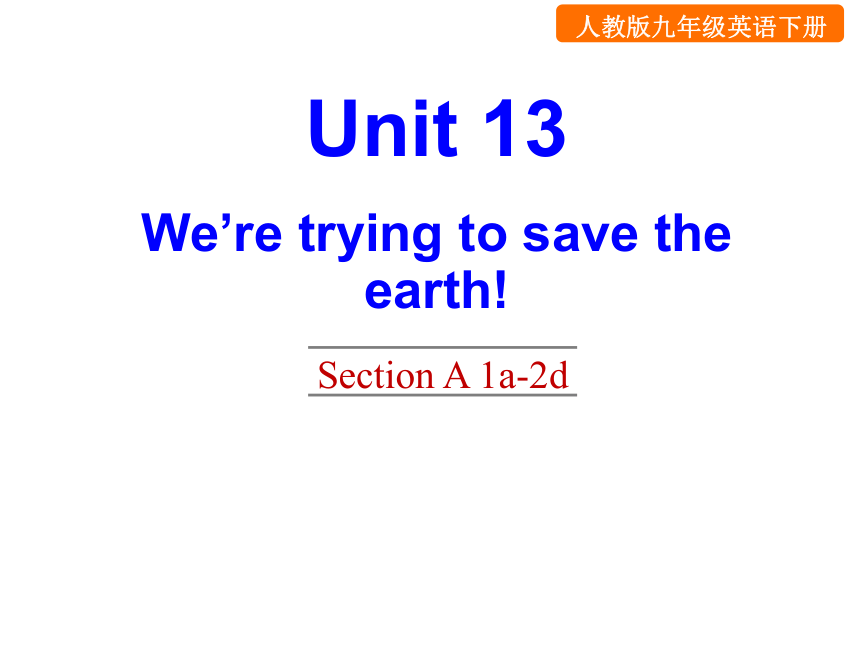 | |
| 格式 | pptx | ||
| 文件大小 | 5.2MB | ||
| 资源类型 | 教案 | ||
| 版本资源 | 人教新目标(Go for it)版 | ||
| 科目 | 英语 | ||
| 更新时间 | 2022-07-04 10:44:50 | ||
图片预览


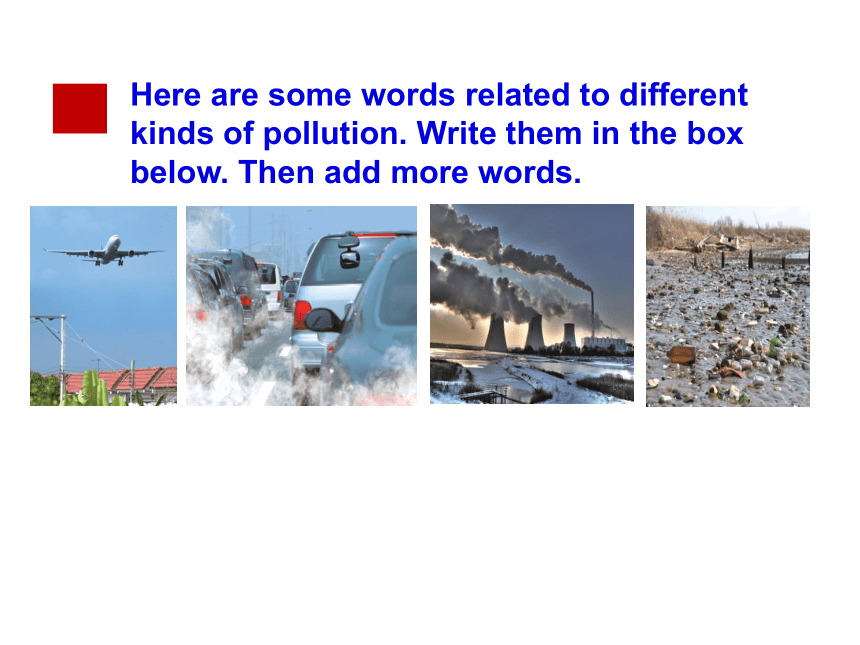

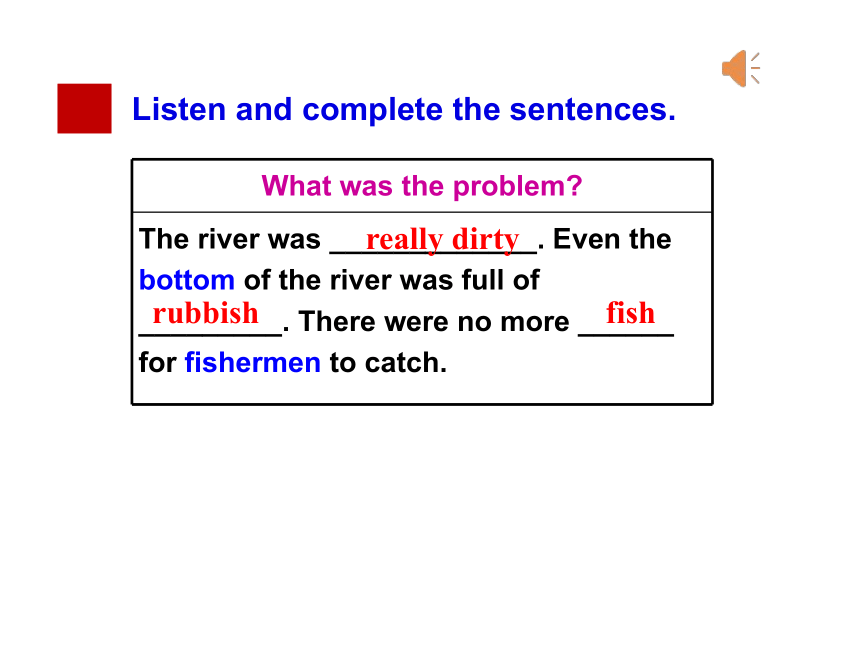
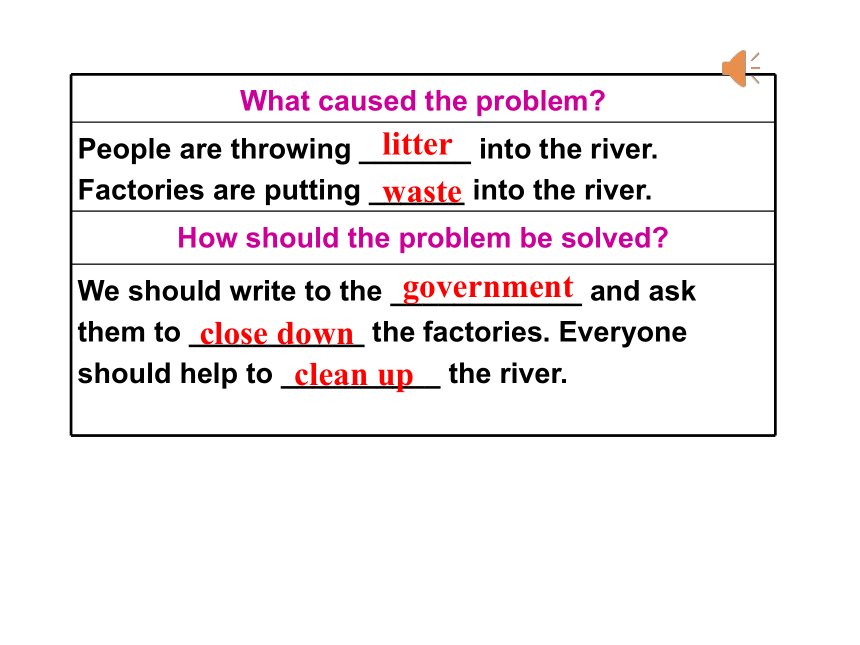
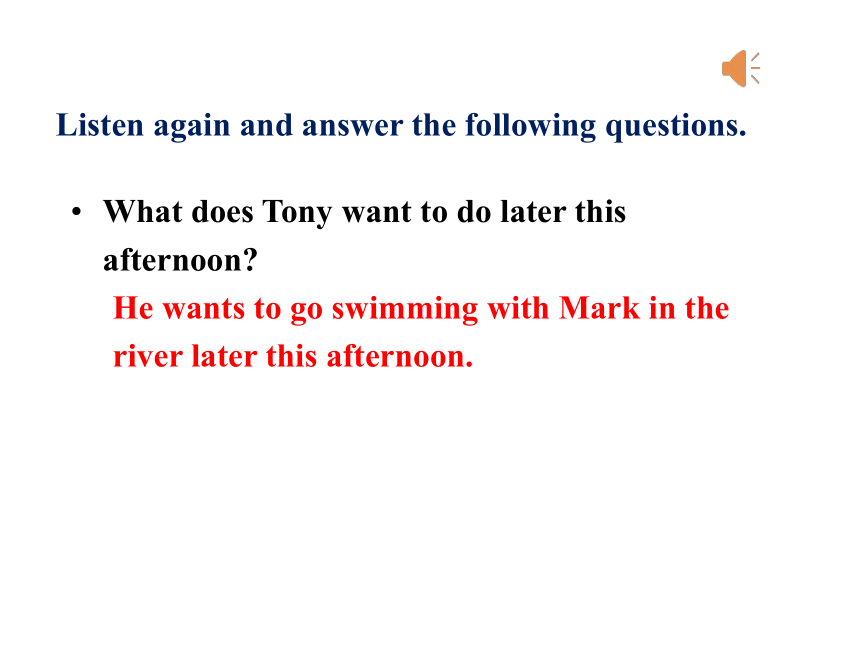
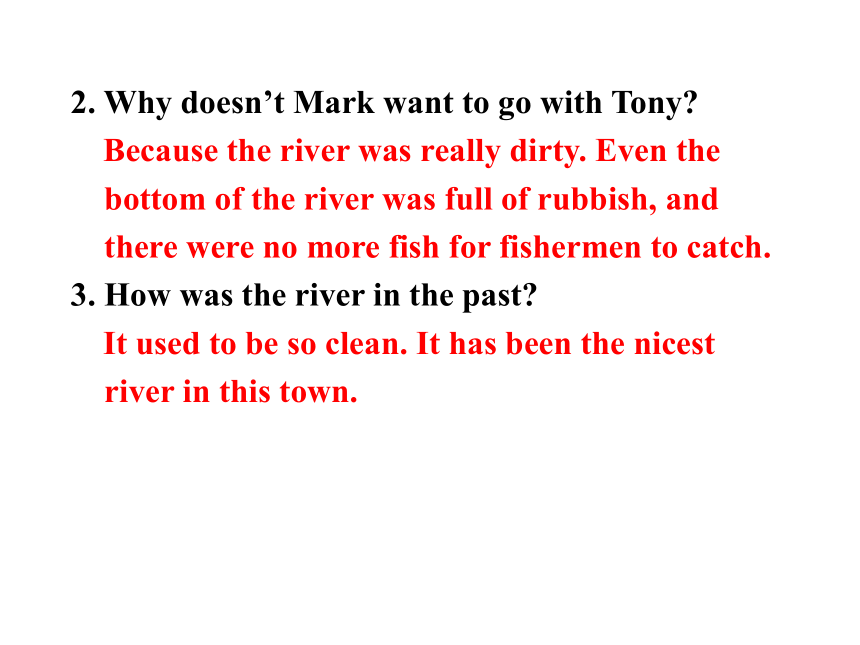
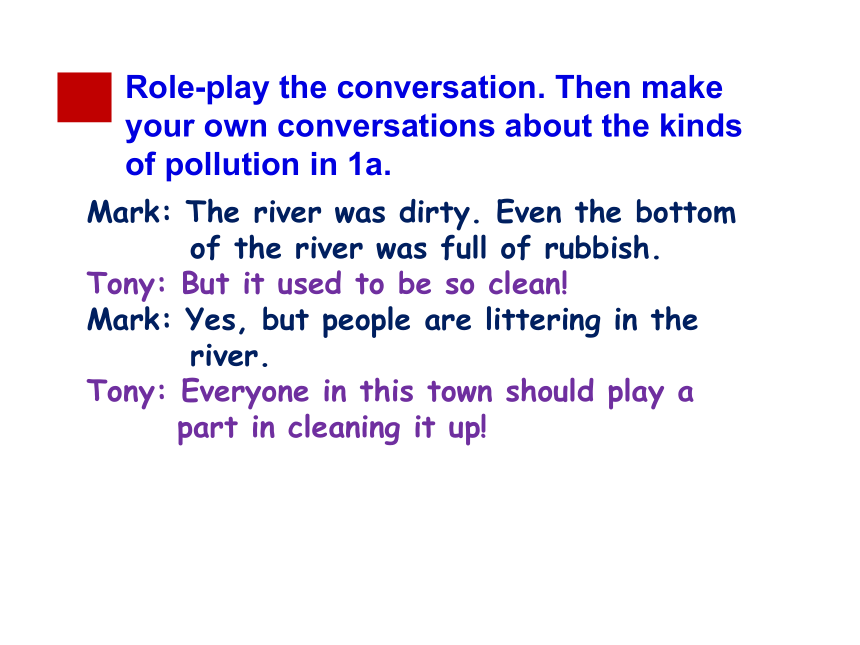
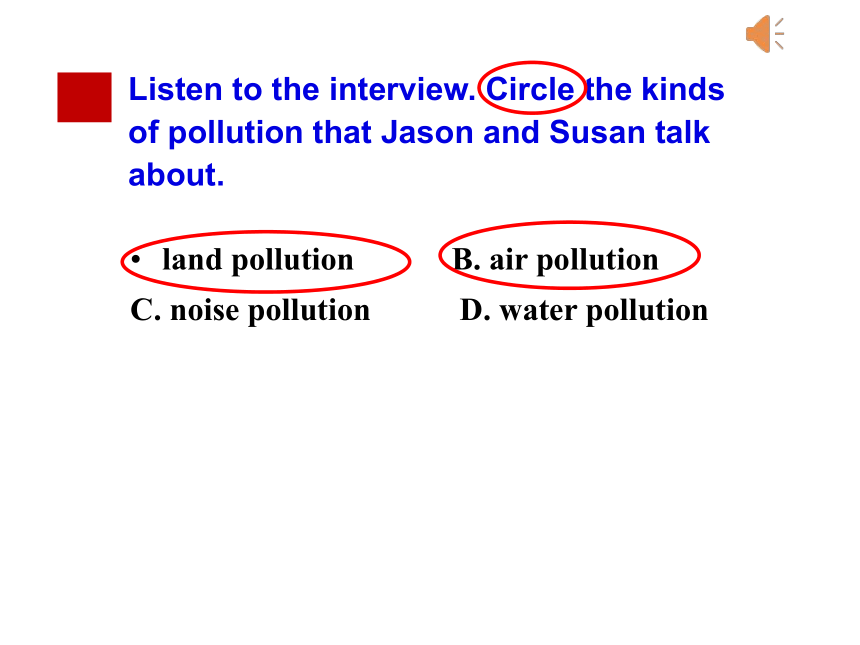
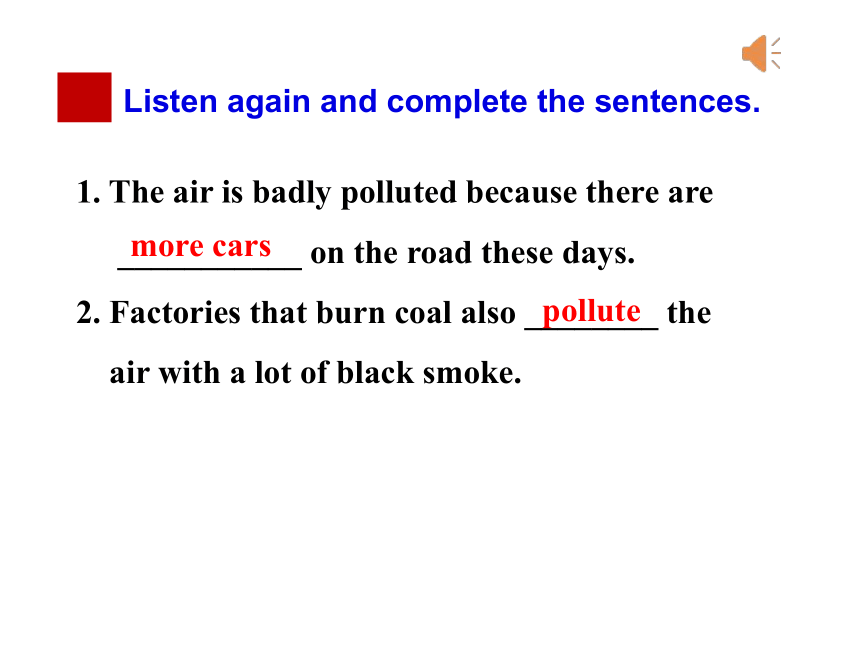
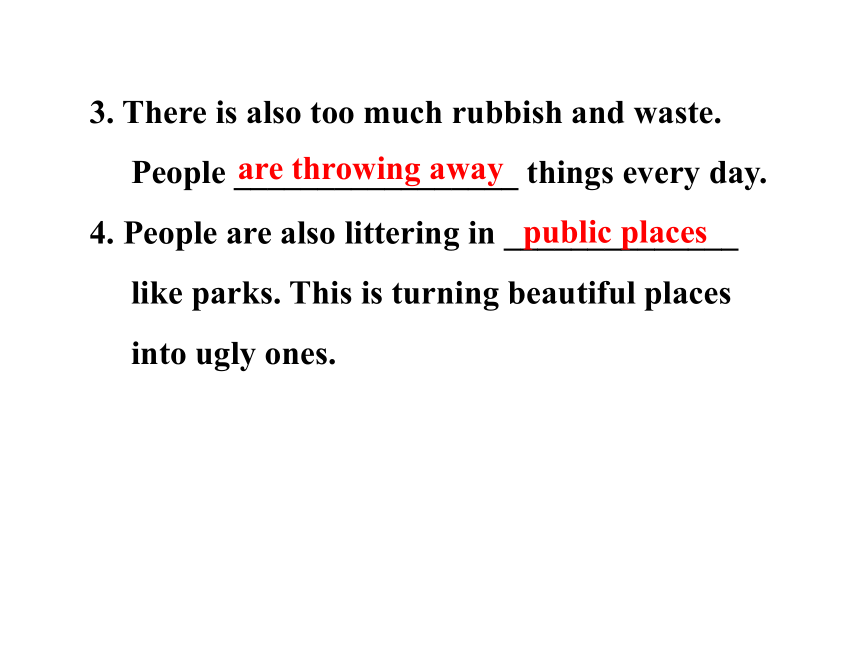
文档简介
(共42张PPT)
Unit 13
We’re trying to save the earth!
人教版九年级英语下册
Section A 1a-2d
Objectives
To talk about air pollution, water pollution
and noise pollution.
To think about ways of protecting the
environment.
To learn to use the sentence patterns
used to...but now
should do sth.
Here are some words related to different kinds of pollution. Write them in the box below. Then add more words.
noise pollution
____________
____________
____________
____________
air pollution
___________
___________
___________
___________
water pollution
____________
____________
____________
____________
loud music
planes
mobile phones
factories
cars
smoking
ships
factories
littering
rubbish
building houses
building houses
loud music cars rubbish planes
littering ships factories smoking
building houses mobile phones
cars
Listen and complete the sentences.
What was the problem
The river was _____________. Even the
bottom of the river was full of
_________. There were no more ______
for fishermen to catch.
really dirty
rubbish
fish
What caused the problem
People are throwing _______ into the river. Factories are putting ______ into the river.
How should the problem be solved
We should write to the ____________ and ask them to ___________ the factories. Everyone should help to __________ the river.
litter
waste
government
close down
clean up
Listen again and answer the following questions.
What does Tony want to do later this afternoon
He wants to go swimming with Mark in the
river later this afternoon.
2. Why doesn’t Mark want to go with Tony
Because the river was really dirty. Even the
bottom of the river was full of rubbish, and
there were no more fish for fishermen to catch.
3. How was the river in the past
It used to be so clean. It has been the nicest
river in this town.
Role-play the conversation. Then make your own conversations about the kinds of pollution in 1a.
Mark: The river was dirty. Even the bottom
of the river was full of rubbish.
Tony: But it used to be so clean!
Mark: Yes, but people are littering in the
river.
Tony: Everyone in this town should play a
part in cleaning it up!
Listen to the interview. Circle the kinds of pollution that Jason and Susan talk about.
land pollution B. air pollution
C. noise pollution D. water pollution
Listen again and complete the sentences.
1. The air is badly polluted because there are
___________ on the road these days.
2. Factories that burn coal also ________ the
air with a lot of black smoke.
more cars
pollute
3. There is also too much rubbish and waste. People _________________ things every day.
4. People are also littering in ______________ like parks. This is turning beautiful places into ugly ones.
are throwing away
public places
Use the information in 2a and 2b to role-play conversations between Jason and Susan.
Jason: The air has become really polluted
around here. I’m getting very
worried.
Susan: Yes, I used to be able to see stars
in the sky.
Jason: The problem is that ...
What should we do to save the earth
Turn off the lights when you leave a room.
stop riding in cars
stop using paper towels or napkins n. 餐巾, 餐巾纸
recycle books and paper
v. 回收利用; 再利用
Interviewer: Jason and Susan, what are your
ideas for solving these problems
Jason: Well, to cut down air pollution, we
should take the bus or subway instead
of driving.
Susan: Yeah, or ride a bike. There are other
advantages of bike riding . It’s good
for health and it doesn’t cost anything!
Role-play the conversation.
Interviewer: Great ideas! What about waste
pollution
Susan: Mmm, I think simple things like
bringing a bag to go shopping can help.
I started doing that a year ago.
Jason: Me, too. Also, I never take wooden
chopsticks or plastic forks when I buy
takeaway food. I use the ones at home.
Susan: And remember to throw
rubbish in the bins and keep
public places clean and
beautiful for everyone.
Interviewer: So together, our actions
can make a difference
and lead to better future!
Complete the chart.
Problems Solving problems
air pollution
waste pollution
take the bus, subway or ride a bike instead of driving
bring a bag to go shopping
use chopsticks or forks at home
hrow rubbish in the bins
We’re trying to save the earth!
我们正在竭尽全力拯救地球!
try to do = try one’s best to do 努力去做某事
e.g. We’ll try to finish the work in a week.
我们将努力在一周内完成这项工作。
Language points
Here are some words related to different
kinds of pollution.
be related to 与……有关
e.g. Is the driver related to the accident
司机和这起事故有关吗?
Even the bottom of the river was full of rubbish.
Yes, but people are throwing litter into the river.
litter和rubbish都可指“垃圾”,用作不可数名词。
litter指“(室内或公共场所)乱扔的废物(纸屑、不要的包装纸、废瓶等)”还可回收。
rubbish指“没用的东西(被扔或将要丢弃的无用的东西)”不可回收。
e.g. Throw the rubbish out.
把垃圾扔出去。
The room is full of rubbish.
房间里堆满了垃圾。
Pick up your litter after a picnic.
野餐后将废弃物收拾好。
Everyone in this town should play a part in
cleaning it up!
play a part in 在……方面起作用
e.g. A good diet plays a large part in helping
people live longer.
健康的饮食在帮助人们长寿方面起着非常
大的作用。
It’s good for health and it doesn’t cost anything!
cost v. 花费;使付出,指花费金钱,主语通常是物。cost的过去式和过去分词均为cost。
e.g. The new shirt cost Mr Wang 200 yuan.
王先生花了200元买了新衬衫。
How much does the new computer cost
新电脑花了多少钱?
take, spend, pay & cost
take,spend,pay和cost都可以表示“花费”,
但它们的用法各有不同。
take多表示花费时间
常用于It takes sb. some time to do sth.句型中,其中it作形式主语。
e.g. It usually takes me 40 minutes to cook the
dinner.
spend多表示花费时间和金钱,主语常是人,
常用于sb. spend(s) some time / money on sth.
sb. spend(s) some time / money (in) doing sth.
两种句型。
e.g. David spent 2,000 yuan on the new machine.
My father spends an hour (in) watching the
news on TV every day.
pay多表示花费金钱,主语通常是人,常用于sb.
pay(s) some money for sth.句型。
e.g. Tommy paid 20 yuan for his breakfast
yesterday.
cost多表示花费金钱,主语通常是物,常用于sth.
cost(s) (sb.) some money.句型。
e.g. The new dress cost Linda 88 yuan.
根据句意用take, spend, pay或cost的适当形式填空。
1. That new car ________ them lots of money.
2. Mona __________ 50 yuan on the books just now.
3. It usually _______ me an hour to do my
homework.
cost
spent
takes
4. You should __________ some time practising your pronunciation.
5. My brother _______ 6, 000 yuan for the new computer yesterday.
spend
paid
Exercises
bin, cost, coal, fisherman, takeaway
1. A hot ________ fell out of the fire and burnt the
carpet (地毯).
2. A __________ is hot cooked food that you buy from
a shop or restaurant and eat somewhere else.
coal
takeaway
I. 根据句意,从方框中选择恰当的单词填空,
有的需要变换形式。
3. Do you want this or shall I throw it in the
________
4. Writing such a long novel ________ much
time and patience.
5. Look! Some ____________ are catching fish
over there.
costs
fishermen
bin
II. 根据汉语意思完成英语句子。
1. 工人们正在竭尽全力降低事故率。
The workers are doing all they can ___________
the accident rate.
2. 左边第二个房间里堆满了书。
The second room on the left is _______________
books.
to cut down
full of / filled with
3. 你应该向那些参与挽救病人的医生道谢。
You should say thanks to those doctors who
have _________________ saving the patient.
played a part in
4. 拉里将去开会,而不是我。
Larry will go to the meeting __________ me.
instead of
5. 我的目的是把这件坏事变成好事。
My purpose is to ________ this bad thing
________ a good one.
6. 保持教室干净是我们的责任。
It’s our duty to ________ the classroom
_______.
turn
keep
into
clean
7. 我们小区的噪音污染很严重。
The _________________ in our neighborhood
is very serious.
noise pollution
III. 汉译英。
我尽量今天晚上完成工作。
他在工作中其重要作用。
这些问题都是密切相关的。
I will try to finish the work this evening.
He plays an important part in the work.
These problems are closely related.
中考链接
(2019·贵州安顺)
—My father _________ to his workplace by bus, but
now he __________ there by bike.
—Really You have an environmentally-friendly father.
A. used to go, is used to go
B. used to going, is used to go
C. is used to go, is used to going
D. used to go, is used to going
D
1.Write a short passage about how
to protect our environment.
2. Preview the new words and expressions.
3. Preview the article on page 99.
Homework
Unit 13
We’re trying to save the earth!
人教版九年级英语下册
Section A 1a-2d
Objectives
To talk about air pollution, water pollution
and noise pollution.
To think about ways of protecting the
environment.
To learn to use the sentence patterns
used to...but now
should do sth.
Here are some words related to different kinds of pollution. Write them in the box below. Then add more words.
noise pollution
____________
____________
____________
____________
air pollution
___________
___________
___________
___________
water pollution
____________
____________
____________
____________
loud music
planes
mobile phones
factories
cars
smoking
ships
factories
littering
rubbish
building houses
building houses
loud music cars rubbish planes
littering ships factories smoking
building houses mobile phones
cars
Listen and complete the sentences.
What was the problem
The river was _____________. Even the
bottom of the river was full of
_________. There were no more ______
for fishermen to catch.
really dirty
rubbish
fish
What caused the problem
People are throwing _______ into the river. Factories are putting ______ into the river.
How should the problem be solved
We should write to the ____________ and ask them to ___________ the factories. Everyone should help to __________ the river.
litter
waste
government
close down
clean up
Listen again and answer the following questions.
What does Tony want to do later this afternoon
He wants to go swimming with Mark in the
river later this afternoon.
2. Why doesn’t Mark want to go with Tony
Because the river was really dirty. Even the
bottom of the river was full of rubbish, and
there were no more fish for fishermen to catch.
3. How was the river in the past
It used to be so clean. It has been the nicest
river in this town.
Role-play the conversation. Then make your own conversations about the kinds of pollution in 1a.
Mark: The river was dirty. Even the bottom
of the river was full of rubbish.
Tony: But it used to be so clean!
Mark: Yes, but people are littering in the
river.
Tony: Everyone in this town should play a
part in cleaning it up!
Listen to the interview. Circle the kinds of pollution that Jason and Susan talk about.
land pollution B. air pollution
C. noise pollution D. water pollution
Listen again and complete the sentences.
1. The air is badly polluted because there are
___________ on the road these days.
2. Factories that burn coal also ________ the
air with a lot of black smoke.
more cars
pollute
3. There is also too much rubbish and waste. People _________________ things every day.
4. People are also littering in ______________ like parks. This is turning beautiful places into ugly ones.
are throwing away
public places
Use the information in 2a and 2b to role-play conversations between Jason and Susan.
Jason: The air has become really polluted
around here. I’m getting very
worried.
Susan: Yes, I used to be able to see stars
in the sky.
Jason: The problem is that ...
What should we do to save the earth
Turn off the lights when you leave a room.
stop riding in cars
stop using paper towels or napkins n. 餐巾, 餐巾纸
recycle books and paper
v. 回收利用; 再利用
Interviewer: Jason and Susan, what are your
ideas for solving these problems
Jason: Well, to cut down air pollution, we
should take the bus or subway instead
of driving.
Susan: Yeah, or ride a bike. There are other
advantages of bike riding . It’s good
for health and it doesn’t cost anything!
Role-play the conversation.
Interviewer: Great ideas! What about waste
pollution
Susan: Mmm, I think simple things like
bringing a bag to go shopping can help.
I started doing that a year ago.
Jason: Me, too. Also, I never take wooden
chopsticks or plastic forks when I buy
takeaway food. I use the ones at home.
Susan: And remember to throw
rubbish in the bins and keep
public places clean and
beautiful for everyone.
Interviewer: So together, our actions
can make a difference
and lead to better future!
Complete the chart.
Problems Solving problems
air pollution
waste pollution
take the bus, subway or ride a bike instead of driving
bring a bag to go shopping
use chopsticks or forks at home
hrow rubbish in the bins
We’re trying to save the earth!
我们正在竭尽全力拯救地球!
try to do = try one’s best to do 努力去做某事
e.g. We’ll try to finish the work in a week.
我们将努力在一周内完成这项工作。
Language points
Here are some words related to different
kinds of pollution.
be related to 与……有关
e.g. Is the driver related to the accident
司机和这起事故有关吗?
Even the bottom of the river was full of rubbish.
Yes, but people are throwing litter into the river.
litter和rubbish都可指“垃圾”,用作不可数名词。
litter指“(室内或公共场所)乱扔的废物(纸屑、不要的包装纸、废瓶等)”还可回收。
rubbish指“没用的东西(被扔或将要丢弃的无用的东西)”不可回收。
e.g. Throw the rubbish out.
把垃圾扔出去。
The room is full of rubbish.
房间里堆满了垃圾。
Pick up your litter after a picnic.
野餐后将废弃物收拾好。
Everyone in this town should play a part in
cleaning it up!
play a part in 在……方面起作用
e.g. A good diet plays a large part in helping
people live longer.
健康的饮食在帮助人们长寿方面起着非常
大的作用。
It’s good for health and it doesn’t cost anything!
cost v. 花费;使付出,指花费金钱,主语通常是物。cost的过去式和过去分词均为cost。
e.g. The new shirt cost Mr Wang 200 yuan.
王先生花了200元买了新衬衫。
How much does the new computer cost
新电脑花了多少钱?
take, spend, pay & cost
take,spend,pay和cost都可以表示“花费”,
但它们的用法各有不同。
take多表示花费时间
常用于It takes sb. some time to do sth.句型中,其中it作形式主语。
e.g. It usually takes me 40 minutes to cook the
dinner.
spend多表示花费时间和金钱,主语常是人,
常用于sb. spend(s) some time / money on sth.
sb. spend(s) some time / money (in) doing sth.
两种句型。
e.g. David spent 2,000 yuan on the new machine.
My father spends an hour (in) watching the
news on TV every day.
pay多表示花费金钱,主语通常是人,常用于sb.
pay(s) some money for sth.句型。
e.g. Tommy paid 20 yuan for his breakfast
yesterday.
cost多表示花费金钱,主语通常是物,常用于sth.
cost(s) (sb.) some money.句型。
e.g. The new dress cost Linda 88 yuan.
根据句意用take, spend, pay或cost的适当形式填空。
1. That new car ________ them lots of money.
2. Mona __________ 50 yuan on the books just now.
3. It usually _______ me an hour to do my
homework.
cost
spent
takes
4. You should __________ some time practising your pronunciation.
5. My brother _______ 6, 000 yuan for the new computer yesterday.
spend
paid
Exercises
bin, cost, coal, fisherman, takeaway
1. A hot ________ fell out of the fire and burnt the
carpet (地毯).
2. A __________ is hot cooked food that you buy from
a shop or restaurant and eat somewhere else.
coal
takeaway
I. 根据句意,从方框中选择恰当的单词填空,
有的需要变换形式。
3. Do you want this or shall I throw it in the
________
4. Writing such a long novel ________ much
time and patience.
5. Look! Some ____________ are catching fish
over there.
costs
fishermen
bin
II. 根据汉语意思完成英语句子。
1. 工人们正在竭尽全力降低事故率。
The workers are doing all they can ___________
the accident rate.
2. 左边第二个房间里堆满了书。
The second room on the left is _______________
books.
to cut down
full of / filled with
3. 你应该向那些参与挽救病人的医生道谢。
You should say thanks to those doctors who
have _________________ saving the patient.
played a part in
4. 拉里将去开会,而不是我。
Larry will go to the meeting __________ me.
instead of
5. 我的目的是把这件坏事变成好事。
My purpose is to ________ this bad thing
________ a good one.
6. 保持教室干净是我们的责任。
It’s our duty to ________ the classroom
_______.
turn
keep
into
clean
7. 我们小区的噪音污染很严重。
The _________________ in our neighborhood
is very serious.
noise pollution
III. 汉译英。
我尽量今天晚上完成工作。
他在工作中其重要作用。
这些问题都是密切相关的。
I will try to finish the work this evening.
He plays an important part in the work.
These problems are closely related.
中考链接
(2019·贵州安顺)
—My father _________ to his workplace by bus, but
now he __________ there by bike.
—Really You have an environmentally-friendly father.
A. used to go, is used to go
B. used to going, is used to go
C. is used to go, is used to going
D. used to go, is used to going
D
1.Write a short passage about how
to protect our environment.
2. Preview the new words and expressions.
3. Preview the article on page 99.
Homework
同课章节目录
- Unit 1 How can we become good learners.
- Section A
- Section B
- Unit 2 I think that mooncakes are delicious!
- Section A
- Section B
- Unit 3 Could you please tell me where the restroom
- Section A
- Section B
- Unit 4 I used to be afraid of the dark.
- Section A
- Section B
- Unit 5 What are the shirts made of?
- Section A
- Section B
- Review of Units 1-5
- Unit 6 When was it invented?
- Section A
- Section B
- Unit 7 Teenagers should be allowed to choose their
- Section A
- Section B
- Unit 8 It must belong to Carla.
- Section A
- Section B
- Unit 9 I like music that I can dance to.
- Section A
- Section B
- Unit 10 You're supposed to shake hands.
- Section A
- Section B
- Review of Units 6-10
- Unit 11 Sad movies make me cry.
- Section A
- Section B
- Unit 12 Life is full of the unexpected
- Section A
- Section B
- Unit 13 We're trying to save the earth!
- Section A
- Section B
- Unit 14 I remember meeting all of you in Grade 7.
- Section A
- Section B
- Review of Units 11-14
